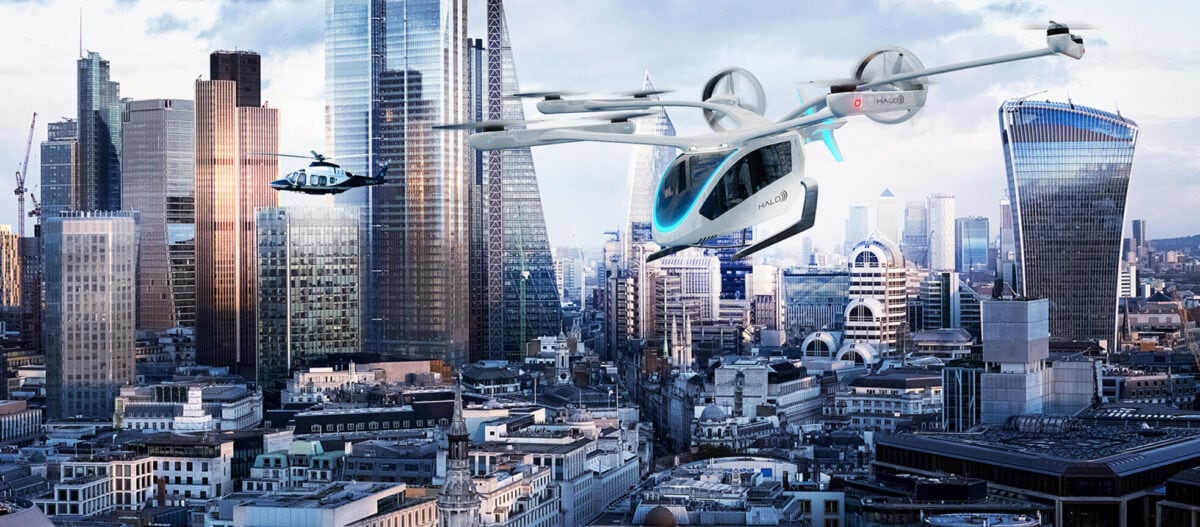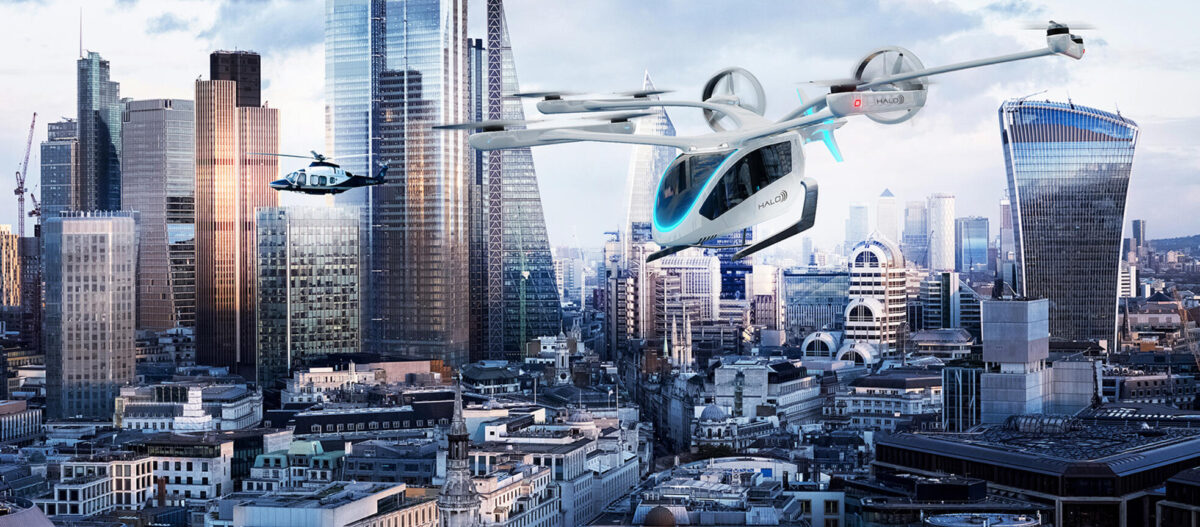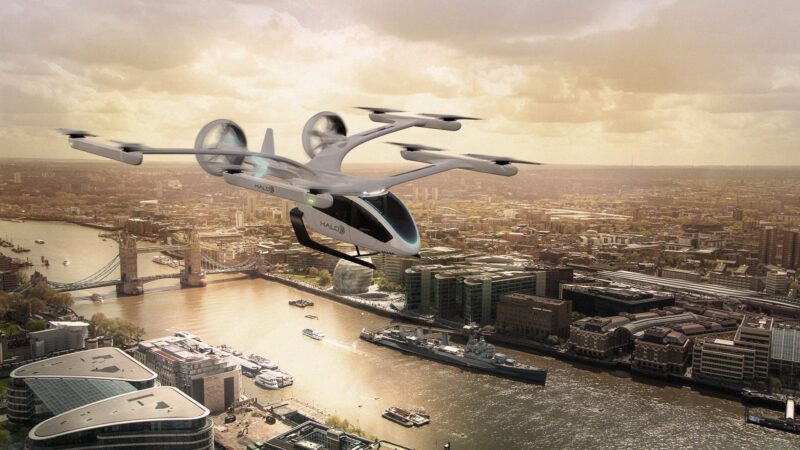Urban Air Mobility (UAM) Gets a Lift from Tall eVTOL Order
London-based Halo Aviation ordered first-round of 200 UAMs
June 8, 2021

If one needs proof that the heretofore visionary air taxi market is becoming tangibly real — well, here you are: In early June, London-based Halo Aviation Ltd. placed a firm order for the first-round of 200 “urban air mobility vehicles” to be produced by Eve Urban Air Mobility Solutions, Melbourne, Florida. Halo provides bespoke helicopter and private urban air mobility travel services in the United States and the United Kingdom. Halo is owned by OneSky Flight, which also owns private jet companies including Flexjet, Sentient Jet, FXAIR and PrivateFly.
The electric vertical take-off and landing (eVTOL) craft have an expected delivery date of 2026. The order makes Halo the launch customer for Eve Urban Air Mobility Solutions. While the eVTOL aircraft get fully phased into service, Halo will continue to operate its Leonardo and Sikorsky helicopters as part of its private aviation service in the Northeastern U.S.
eVTOL Market Takes Off
According to Halo, the first one hundred eVTOLs will be used for Halo’s U.S.-based operations (New York City); the next hundred will be based in the U.K. (London). As well, Halo’s order tends to establish Eve, an independent company formed by private jet maker Embraer S.A. as a leader in the rapidly growing global eVTOL market.
That market is warming up thanks to the proven qualities of unmanned electric drones; the acute congestion spawned by much urban car travel; and the new excitement surrounding UAM generally and globally. To Halo, Eve offered a simple and intuitive eVTOL design that lately reached important development milestones such as its engineering simulator’s maiden flight in July, 2020; and its public proof of concept in October 2020.

Halo used the occasion of the June 1st order to announce that, as a helicopter travel provider, it has subsumed a U.S.-based counterpart, Associated Aircraft Group (AAG), under the Halo brand. Both companies had been acquired earlier this year by OneSky Flight, a member of the Directional Aviation family.
Halo’s ultimate goal is to have consistent door-to-door air taxi solutions ready for the range of travelers currently utilizing various forms of private aviation–at least, to begin with, in the cities of New York and London, two of the world’s leading business hubs.
In addition, Halo will provide streamlined experiences for world-traveling clients of sister companies in the Directional Aviation family of brands: Flexjet, Sentient Jet, PrivateFly and FXAIR — the point being to test how Halo’s developing vertical lift operations can be promoted easily via OneSky’s other, private, jet-based companies (Flexjet is a luxury fractional jet provider; Sentient Jet is a jet card pioneer; PrivateFly and FXAIR are on-demand jet charter companies).
Certainly Halo and Eve have been backed by established and experienced aviation developers. Eve’s story especially is one of leading-edge provenance. Eve was not only incubated by Embraer. Atech, an Embraer subsidiary, is developing a so-called urban air traffic management (UATM) system. The system is intended to allow Halo’s new eVTOLs (among others) to operate safely and efficiently.
Indeed, the two firms and/or units of their parent companies have a substantial history of fruitful partnerships. Over the last few decades, for example, Embraer and OneSky have introduced four new aircraft types.
Hailing the order was Sentient Jet’s CEO, Andrew Collins, who, on behalf of OneSky, leads the transition from “helicopter travel” to “vertical lift.” “Where private aviation was previously thought of in terms of moving people from airport to airport,” says Collins, “today, doorstep-to-doorstep travel is an increasingly viable concept. Halo and AAG are particularly well-positioned and competent to create that new reality. We are on the cusp of realizing innovations that were once just imagined.”
Nearly a dozen eVTOL aircraft designs were evaluated before Halo selected Eve’s as its launch product–that is, the primary craft intended to deliver on its vertical lift vision. Eve’s aircraft and Eve as a manufacturer, said Kenneth Ricci, a principal at Directional, were selected on several grounds that pointed to the company’s future success with Halo.
“We believe Eve has designed an aircraft that not only is well-prepared for initial certification but already has a proven track record of production,” Ricci says. “Embraer’s development means Eve has an impressive lineage of aircraft design, certification and production giving it a significant competitive advantage in our context.
“Product support in particular will be vital to our success as operators. We believe Embraer’s involvement with Eve will create one of the world’s most successful product support infrastructures. Finally, there is the work that Eve and Embraer have accomplished around their traffic management system. It is another example of how uniquely positioned Eve is to help us deliver on our vision.”
Incubated by Embraer, but with its own startup mentality, Eve leverages the former’s 50 years of aerospace expertise to address the singular challenges of eVTOL travel. “This partnership is an important step for Eve to assume its position as a global leader in the UAM industry,” said Andre Stein, President and CEO of Eve Urban Air Mobility.
“We are ready to build the future of mobility with our partners in an extremely collaborative way. Halo is aligned with our mission to create comprehensive urban air mobility solutions, and this order marks an important milestone for Eve in key markets. We are confident that this mutually beneficial relationship will have a positive impact for many future users and enable both companies to grow their businesses exponentially.”
Holistic Approach to UAM
The upshot, according to management, is that Eve may be taking the world’s first holistic approach to urban air mobility–advancing vertical lift to the next level by combining new aircraft technology and comprehensive global services, support and a traffic management network.
Meanwhile, in the U.K., Eve has been advancing vertical lift in the U.K. by heading up a consortium that is clearing the regulatory and operational issues to bringing eVTOL operations to London. Eve and Halo will work together with the U.K. Civil Aviation Authority and U.S. regulators to advance the first international eVTOL operator partnership of its kind. This will be key to creating a true urban air mobility ecosystem, says Ricci.




